Legislation, Ethics, and Impact in Travel and Tourism Sector Report
VerifiedAdded on 2020/12/26
|13
|3869
|446
Report
AI Summary
This report provides a comprehensive analysis of the legal and ethical considerations within the travel and tourism sector, using Thomas Cook as a case study. It delves into the legal and regulatory frameworks, including the Development of Tourism Act, 1969, and transport laws concerning surface, sea, and air travel. The report examines the impact of health, safety, and security legislation, as well as the Equality Act 2010, highlighting various forms of discrimination and their implications. Furthermore, it explores contract and consumer protection legislation, emphasizing the importance of legal contracts and adherence to consumer rights. The report also addresses ethical dilemmas and corporate social responsibility policies within the industry, offering a well-rounded perspective on the complexities of operating in the travel and tourism sector.
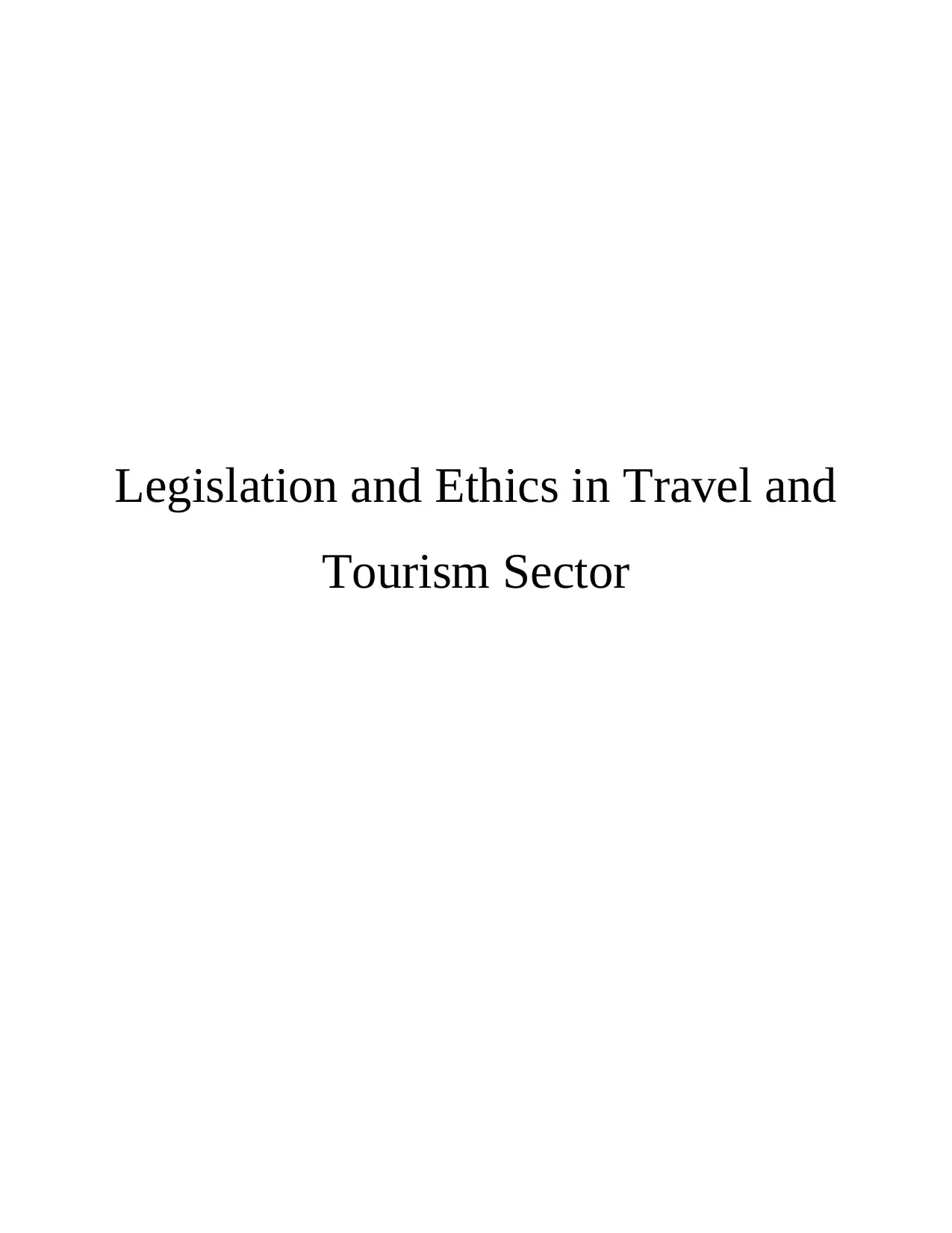
Legislation and Ethics in Travel and
Tourism Sector
Tourism Sector
Paraphrase This Document
Need a fresh take? Get an instant paraphrase of this document with our AI Paraphraser
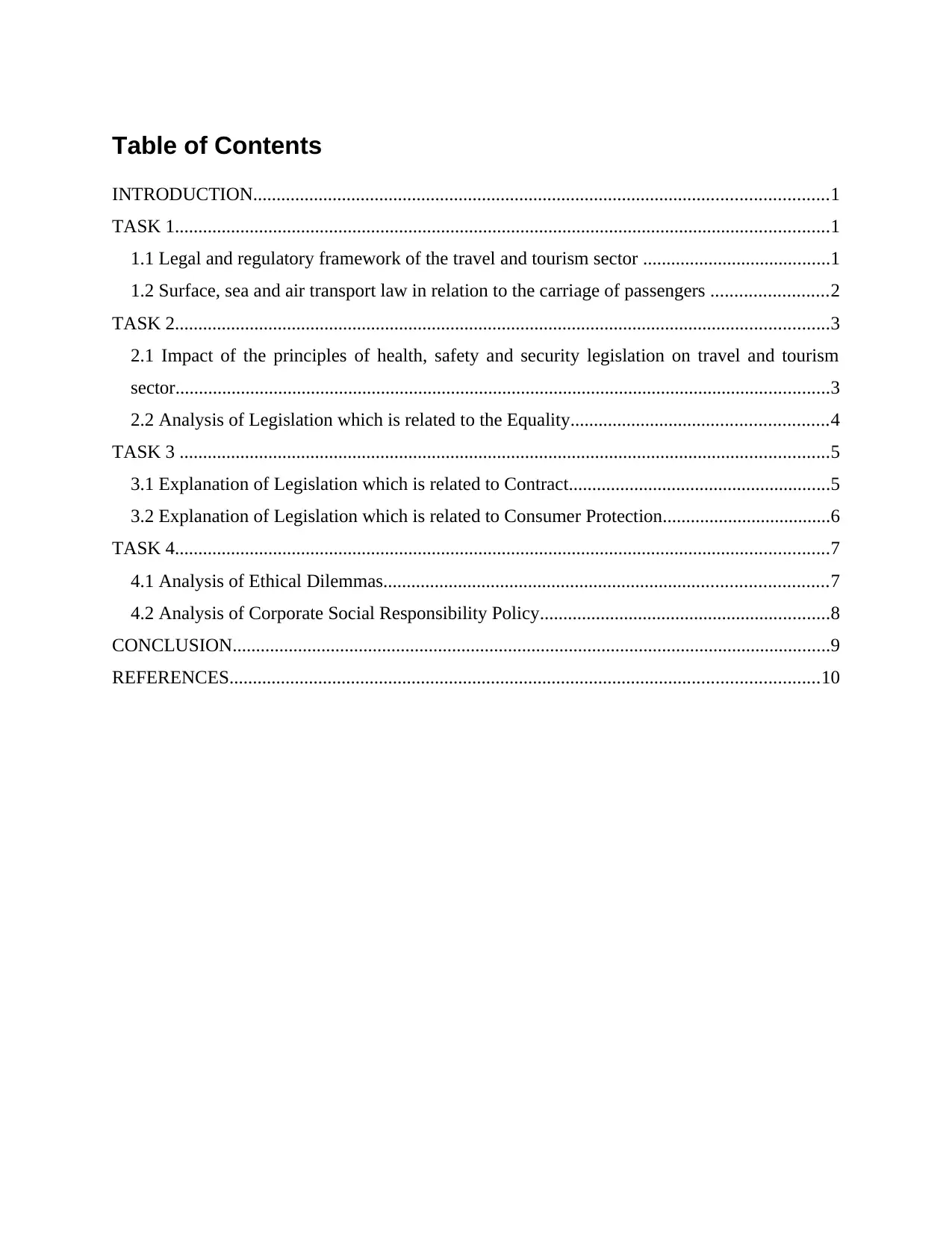
Table of Contents
INTRODUCTION...........................................................................................................................1
TASK 1............................................................................................................................................1
1.1 Legal and regulatory framework of the travel and tourism sector ........................................1
1.2 Surface, sea and air transport law in relation to the carriage of passengers .........................2
TASK 2............................................................................................................................................3
2.1 Impact of the principles of health, safety and security legislation on travel and tourism
sector............................................................................................................................................3
2.2 Analysis of Legislation which is related to the Equality.......................................................4
TASK 3 ...........................................................................................................................................5
3.1 Explanation of Legislation which is related to Contract........................................................5
3.2 Explanation of Legislation which is related to Consumer Protection....................................6
TASK 4............................................................................................................................................7
4.1 Analysis of Ethical Dilemmas...............................................................................................7
4.2 Analysis of Corporate Social Responsibility Policy..............................................................8
CONCLUSION................................................................................................................................9
REFERENCES..............................................................................................................................10
INTRODUCTION...........................................................................................................................1
TASK 1............................................................................................................................................1
1.1 Legal and regulatory framework of the travel and tourism sector ........................................1
1.2 Surface, sea and air transport law in relation to the carriage of passengers .........................2
TASK 2............................................................................................................................................3
2.1 Impact of the principles of health, safety and security legislation on travel and tourism
sector............................................................................................................................................3
2.2 Analysis of Legislation which is related to the Equality.......................................................4
TASK 3 ...........................................................................................................................................5
3.1 Explanation of Legislation which is related to Contract........................................................5
3.2 Explanation of Legislation which is related to Consumer Protection....................................6
TASK 4............................................................................................................................................7
4.1 Analysis of Ethical Dilemmas...............................................................................................7
4.2 Analysis of Corporate Social Responsibility Policy..............................................................8
CONCLUSION................................................................................................................................9
REFERENCES..............................................................................................................................10
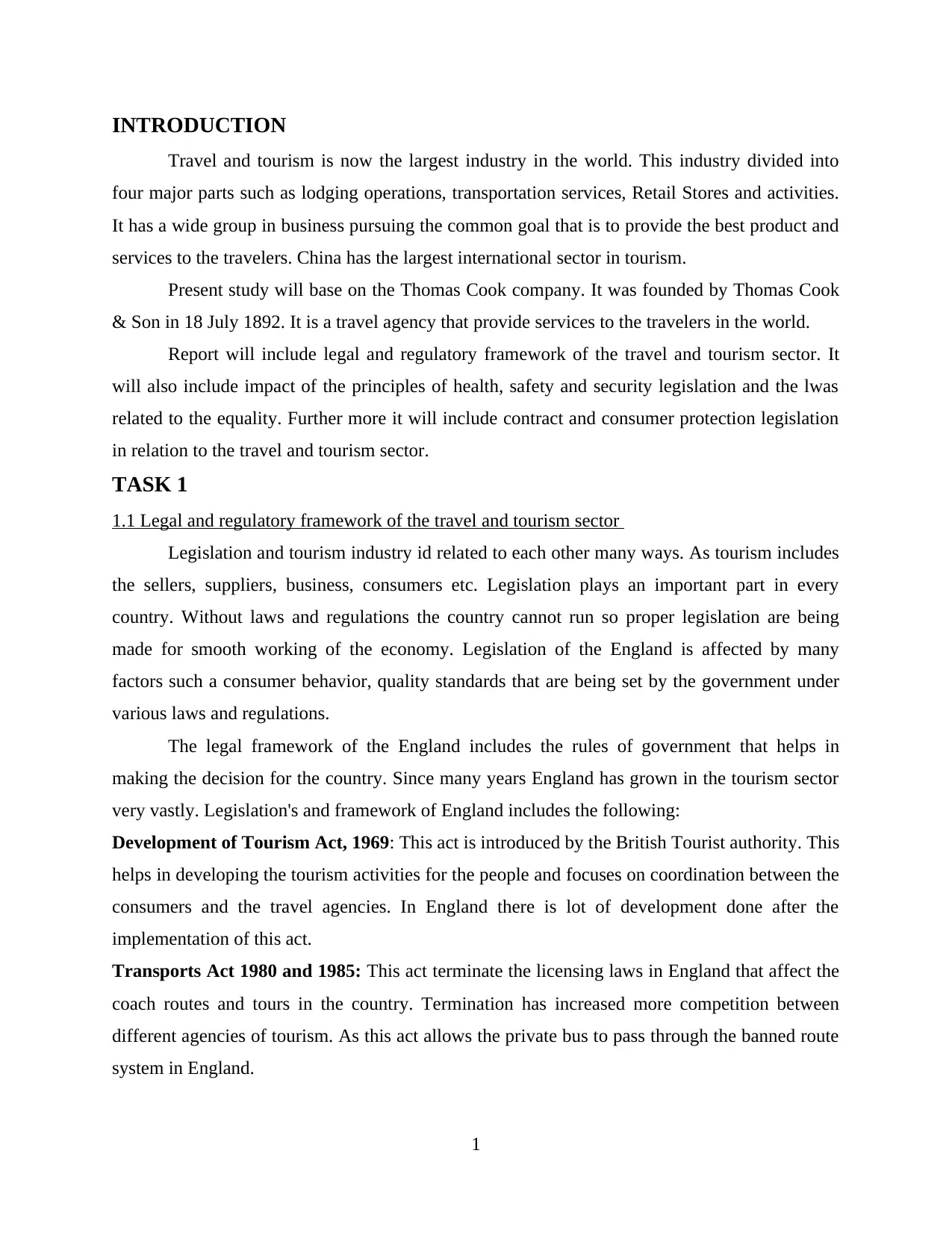
INTRODUCTION
Travel and tourism is now the largest industry in the world. This industry divided into
four major parts such as lodging operations, transportation services, Retail Stores and activities.
It has a wide group in business pursuing the common goal that is to provide the best product and
services to the travelers. China has the largest international sector in tourism.
Present study will base on the Thomas Cook company. It was founded by Thomas Cook
& Son in 18 July 1892. It is a travel agency that provide services to the travelers in the world.
Report will include legal and regulatory framework of the travel and tourism sector. It
will also include impact of the principles of health, safety and security legislation and the lwas
related to the equality. Further more it will include contract and consumer protection legislation
in relation to the travel and tourism sector.
TASK 1
1.1 Legal and regulatory framework of the travel and tourism sector
Legislation and tourism industry id related to each other many ways. As tourism includes
the sellers, suppliers, business, consumers etc. Legislation plays an important part in every
country. Without laws and regulations the country cannot run so proper legislation are being
made for smooth working of the economy. Legislation of the England is affected by many
factors such a consumer behavior, quality standards that are being set by the government under
various laws and regulations.
The legal framework of the England includes the rules of government that helps in
making the decision for the country. Since many years England has grown in the tourism sector
very vastly. Legislation's and framework of England includes the following:
Development of Tourism Act, 1969: This act is introduced by the British Tourist authority. This
helps in developing the tourism activities for the people and focuses on coordination between the
consumers and the travel agencies. In England there is lot of development done after the
implementation of this act.
Transports Act 1980 and 1985: This act terminate the licensing laws in England that affect the
coach routes and tours in the country. Termination has increased more competition between
different agencies of tourism. As this act allows the private bus to pass through the banned route
system in England.
1
Travel and tourism is now the largest industry in the world. This industry divided into
four major parts such as lodging operations, transportation services, Retail Stores and activities.
It has a wide group in business pursuing the common goal that is to provide the best product and
services to the travelers. China has the largest international sector in tourism.
Present study will base on the Thomas Cook company. It was founded by Thomas Cook
& Son in 18 July 1892. It is a travel agency that provide services to the travelers in the world.
Report will include legal and regulatory framework of the travel and tourism sector. It
will also include impact of the principles of health, safety and security legislation and the lwas
related to the equality. Further more it will include contract and consumer protection legislation
in relation to the travel and tourism sector.
TASK 1
1.1 Legal and regulatory framework of the travel and tourism sector
Legislation and tourism industry id related to each other many ways. As tourism includes
the sellers, suppliers, business, consumers etc. Legislation plays an important part in every
country. Without laws and regulations the country cannot run so proper legislation are being
made for smooth working of the economy. Legislation of the England is affected by many
factors such a consumer behavior, quality standards that are being set by the government under
various laws and regulations.
The legal framework of the England includes the rules of government that helps in
making the decision for the country. Since many years England has grown in the tourism sector
very vastly. Legislation's and framework of England includes the following:
Development of Tourism Act, 1969: This act is introduced by the British Tourist authority. This
helps in developing the tourism activities for the people and focuses on coordination between the
consumers and the travel agencies. In England there is lot of development done after the
implementation of this act.
Transports Act 1980 and 1985: This act terminate the licensing laws in England that affect the
coach routes and tours in the country. Termination has increased more competition between
different agencies of tourism. As this act allows the private bus to pass through the banned route
system in England.
1
⊘ This is a preview!⊘
Do you want full access?
Subscribe today to unlock all pages.

Trusted by 1+ million students worldwide
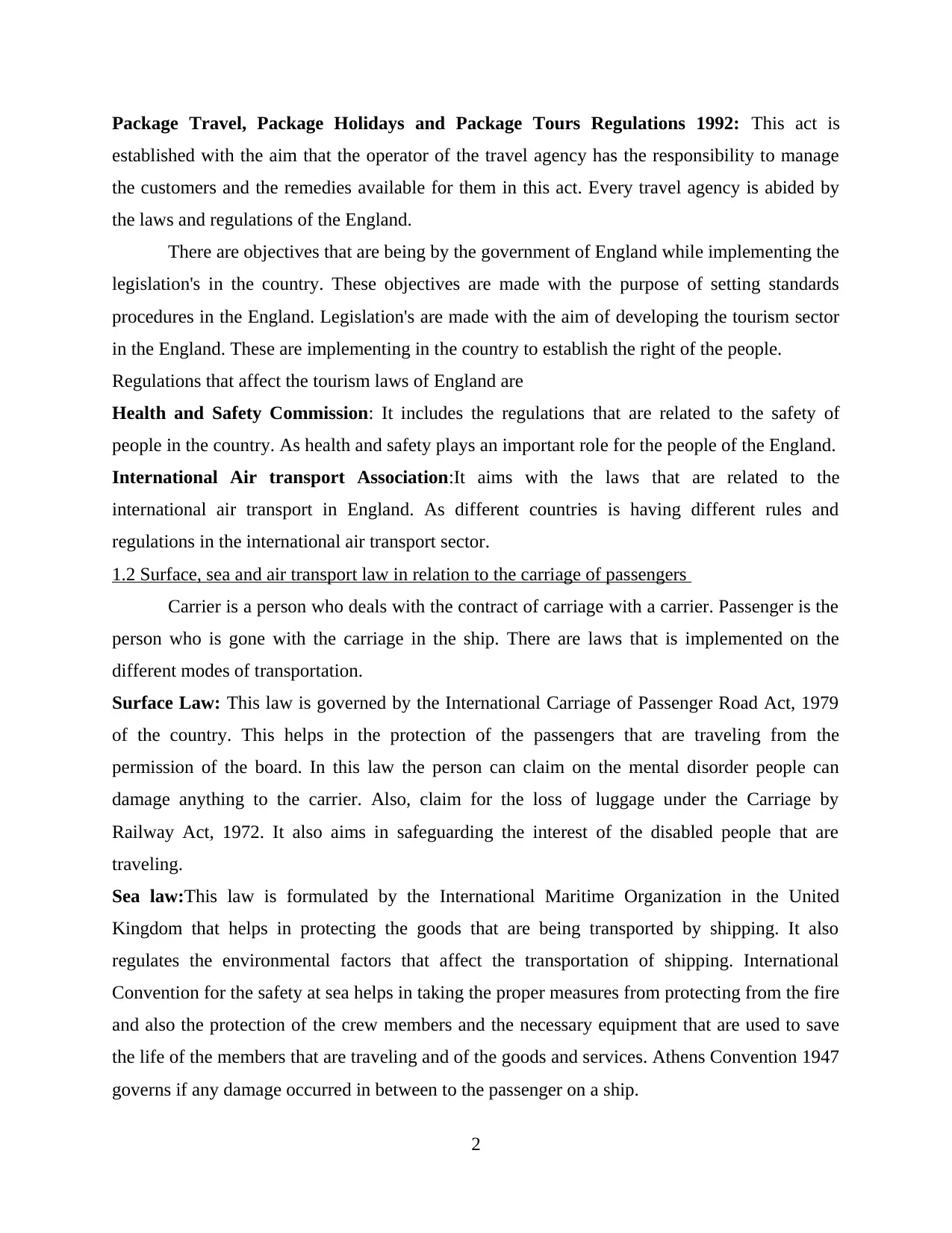
Package Travel, Package Holidays and Package Tours Regulations 1992: This act is
established with the aim that the operator of the travel agency has the responsibility to manage
the customers and the remedies available for them in this act. Every travel agency is abided by
the laws and regulations of the England.
There are objectives that are being by the government of England while implementing the
legislation's in the country. These objectives are made with the purpose of setting standards
procedures in the England. Legislation's are made with the aim of developing the tourism sector
in the England. These are implementing in the country to establish the right of the people.
Regulations that affect the tourism laws of England are
Health and Safety Commission: It includes the regulations that are related to the safety of
people in the country. As health and safety plays an important role for the people of the England.
International Air transport Association:It aims with the laws that are related to the
international air transport in England. As different countries is having different rules and
regulations in the international air transport sector.
1.2 Surface, sea and air transport law in relation to the carriage of passengers
Carrier is a person who deals with the contract of carriage with a carrier. Passenger is the
person who is gone with the carriage in the ship. There are laws that is implemented on the
different modes of transportation.
Surface Law: This law is governed by the International Carriage of Passenger Road Act, 1979
of the country. This helps in the protection of the passengers that are traveling from the
permission of the board. In this law the person can claim on the mental disorder people can
damage anything to the carrier. Also, claim for the loss of luggage under the Carriage by
Railway Act, 1972. It also aims in safeguarding the interest of the disabled people that are
traveling.
Sea law:This law is formulated by the International Maritime Organization in the United
Kingdom that helps in protecting the goods that are being transported by shipping. It also
regulates the environmental factors that affect the transportation of shipping. International
Convention for the safety at sea helps in taking the proper measures from protecting from the fire
and also the protection of the crew members and the necessary equipment that are used to save
the life of the members that are traveling and of the goods and services. Athens Convention 1947
governs if any damage occurred in between to the passenger on a ship.
2
established with the aim that the operator of the travel agency has the responsibility to manage
the customers and the remedies available for them in this act. Every travel agency is abided by
the laws and regulations of the England.
There are objectives that are being by the government of England while implementing the
legislation's in the country. These objectives are made with the purpose of setting standards
procedures in the England. Legislation's are made with the aim of developing the tourism sector
in the England. These are implementing in the country to establish the right of the people.
Regulations that affect the tourism laws of England are
Health and Safety Commission: It includes the regulations that are related to the safety of
people in the country. As health and safety plays an important role for the people of the England.
International Air transport Association:It aims with the laws that are related to the
international air transport in England. As different countries is having different rules and
regulations in the international air transport sector.
1.2 Surface, sea and air transport law in relation to the carriage of passengers
Carrier is a person who deals with the contract of carriage with a carrier. Passenger is the
person who is gone with the carriage in the ship. There are laws that is implemented on the
different modes of transportation.
Surface Law: This law is governed by the International Carriage of Passenger Road Act, 1979
of the country. This helps in the protection of the passengers that are traveling from the
permission of the board. In this law the person can claim on the mental disorder people can
damage anything to the carrier. Also, claim for the loss of luggage under the Carriage by
Railway Act, 1972. It also aims in safeguarding the interest of the disabled people that are
traveling.
Sea law:This law is formulated by the International Maritime Organization in the United
Kingdom that helps in protecting the goods that are being transported by shipping. It also
regulates the environmental factors that affect the transportation of shipping. International
Convention for the safety at sea helps in taking the proper measures from protecting from the fire
and also the protection of the crew members and the necessary equipment that are used to save
the life of the members that are traveling and of the goods and services. Athens Convention 1947
governs if any damage occurred in between to the passenger on a ship.
2
Paraphrase This Document
Need a fresh take? Get an instant paraphrase of this document with our AI Paraphraser
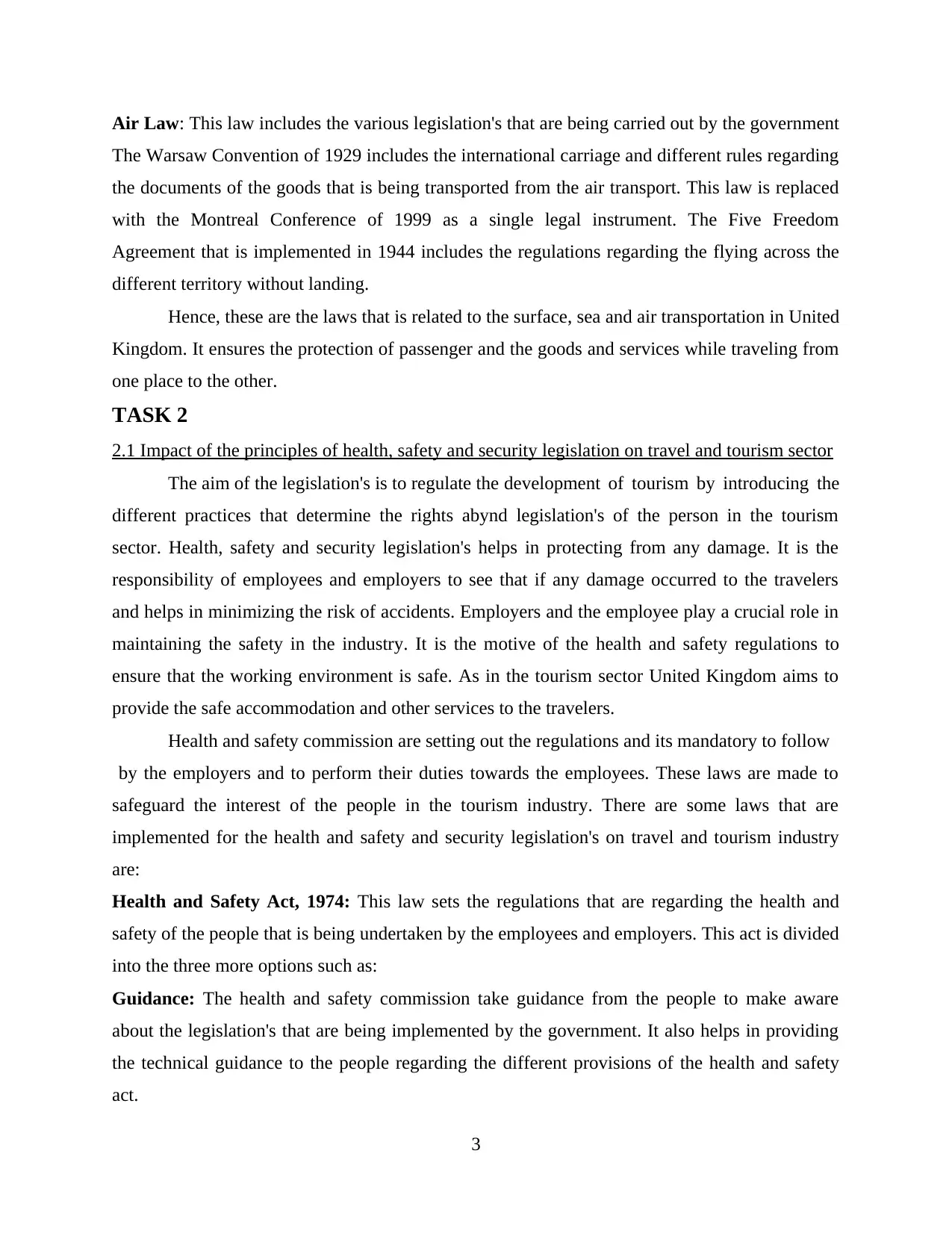
Air Law: This law includes the various legislation's that are being carried out by the government
The Warsaw Convention of 1929 includes the international carriage and different rules regarding
the documents of the goods that is being transported from the air transport. This law is replaced
with the Montreal Conference of 1999 as a single legal instrument. The Five Freedom
Agreement that is implemented in 1944 includes the regulations regarding the flying across the
different territory without landing.
Hence, these are the laws that is related to the surface, sea and air transportation in United
Kingdom. It ensures the protection of passenger and the goods and services while traveling from
one place to the other.
TASK 2
2.1 Impact of the principles of health, safety and security legislation on travel and tourism sector
The aim of the legislation's is to regulate the development of tourism by introducing the
different practices that determine the rights abynd legislation's of the person in the tourism
sector. Health, safety and security legislation's helps in protecting from any damage. It is the
responsibility of employees and employers to see that if any damage occurred to the travelers
and helps in minimizing the risk of accidents. Employers and the employee play a crucial role in
maintaining the safety in the industry. It is the motive of the health and safety regulations to
ensure that the working environment is safe. As in the tourism sector United Kingdom aims to
provide the safe accommodation and other services to the travelers.
Health and safety commission are setting out the regulations and its mandatory to follow
by the employers and to perform their duties towards the employees. These laws are made to
safeguard the interest of the people in the tourism industry. There are some laws that are
implemented for the health and safety and security legislation's on travel and tourism industry
are:
Health and Safety Act, 1974: This law sets the regulations that are regarding the health and
safety of the people that is being undertaken by the employees and employers. This act is divided
into the three more options such as:
Guidance: The health and safety commission take guidance from the people to make aware
about the legislation's that are being implemented by the government. It also helps in providing
the technical guidance to the people regarding the different provisions of the health and safety
act.
3
The Warsaw Convention of 1929 includes the international carriage and different rules regarding
the documents of the goods that is being transported from the air transport. This law is replaced
with the Montreal Conference of 1999 as a single legal instrument. The Five Freedom
Agreement that is implemented in 1944 includes the regulations regarding the flying across the
different territory without landing.
Hence, these are the laws that is related to the surface, sea and air transportation in United
Kingdom. It ensures the protection of passenger and the goods and services while traveling from
one place to the other.
TASK 2
2.1 Impact of the principles of health, safety and security legislation on travel and tourism sector
The aim of the legislation's is to regulate the development of tourism by introducing the
different practices that determine the rights abynd legislation's of the person in the tourism
sector. Health, safety and security legislation's helps in protecting from any damage. It is the
responsibility of employees and employers to see that if any damage occurred to the travelers
and helps in minimizing the risk of accidents. Employers and the employee play a crucial role in
maintaining the safety in the industry. It is the motive of the health and safety regulations to
ensure that the working environment is safe. As in the tourism sector United Kingdom aims to
provide the safe accommodation and other services to the travelers.
Health and safety commission are setting out the regulations and its mandatory to follow
by the employers and to perform their duties towards the employees. These laws are made to
safeguard the interest of the people in the tourism industry. There are some laws that are
implemented for the health and safety and security legislation's on travel and tourism industry
are:
Health and Safety Act, 1974: This law sets the regulations that are regarding the health and
safety of the people that is being undertaken by the employees and employers. This act is divided
into the three more options such as:
Guidance: The health and safety commission take guidance from the people to make aware
about the legislation's that are being implemented by the government. It also helps in providing
the technical guidance to the people regarding the different provisions of the health and safety
act.
3
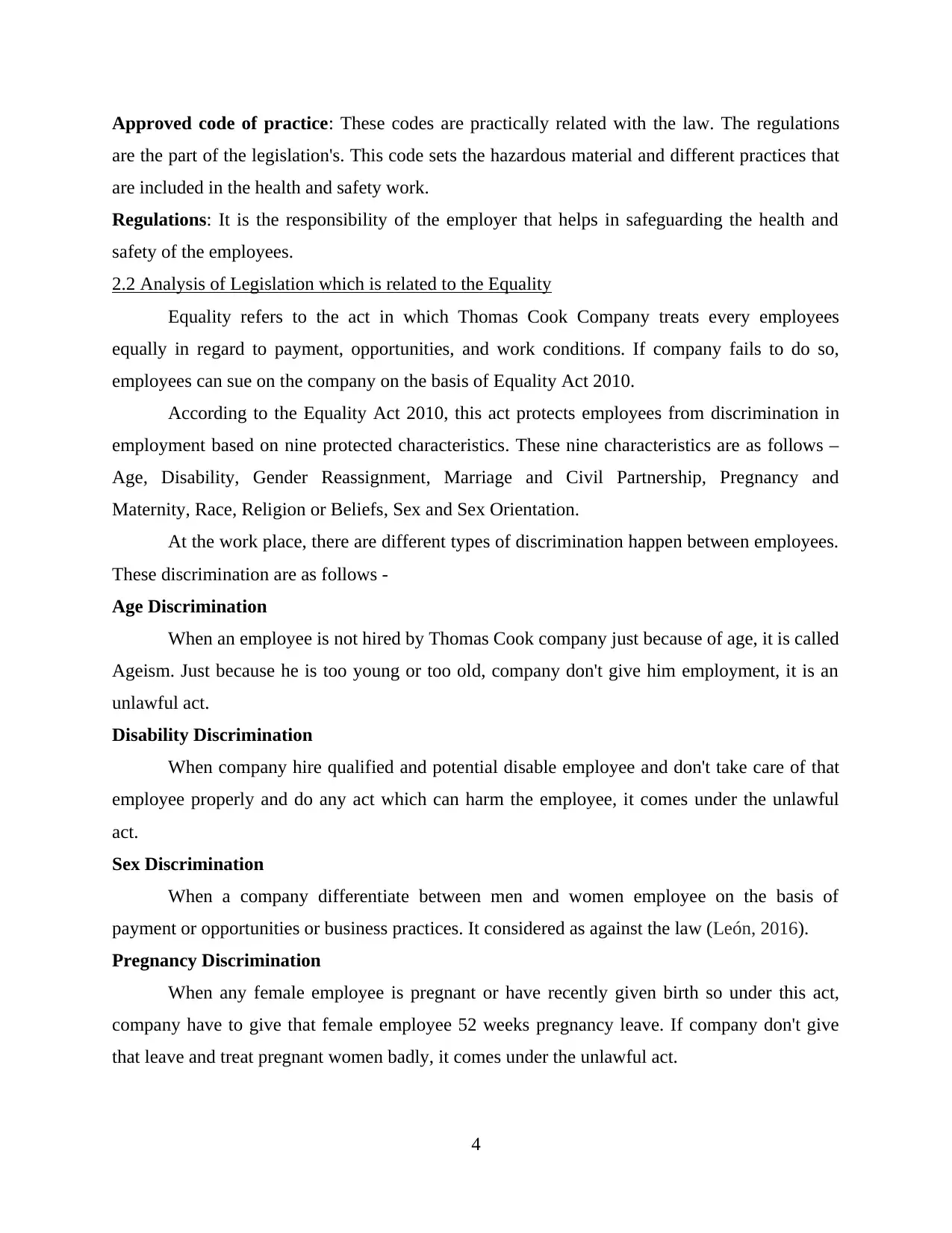
Approved code of practice: These codes are practically related with the law. The regulations
are the part of the legislation's. This code sets the hazardous material and different practices that
are included in the health and safety work.
Regulations: It is the responsibility of the employer that helps in safeguarding the health and
safety of the employees.
2.2 Analysis of Legislation which is related to the Equality
Equality refers to the act in which Thomas Cook Company treats every employees
equally in regard to payment, opportunities, and work conditions. If company fails to do so,
employees can sue on the company on the basis of Equality Act 2010.
According to the Equality Act 2010, this act protects employees from discrimination in
employment based on nine protected characteristics. These nine characteristics are as follows –
Age, Disability, Gender Reassignment, Marriage and Civil Partnership, Pregnancy and
Maternity, Race, Religion or Beliefs, Sex and Sex Orientation.
At the work place, there are different types of discrimination happen between employees.
These discrimination are as follows -
Age Discrimination
When an employee is not hired by Thomas Cook company just because of age, it is called
Ageism. Just because he is too young or too old, company don't give him employment, it is an
unlawful act.
Disability Discrimination
When company hire qualified and potential disable employee and don't take care of that
employee properly and do any act which can harm the employee, it comes under the unlawful
act.
Sex Discrimination
When a company differentiate between men and women employee on the basis of
payment or opportunities or business practices. It considered as against the law (León, 2016).
Pregnancy Discrimination
When any female employee is pregnant or have recently given birth so under this act,
company have to give that female employee 52 weeks pregnancy leave. If company don't give
that leave and treat pregnant women badly, it comes under the unlawful act.
4
are the part of the legislation's. This code sets the hazardous material and different practices that
are included in the health and safety work.
Regulations: It is the responsibility of the employer that helps in safeguarding the health and
safety of the employees.
2.2 Analysis of Legislation which is related to the Equality
Equality refers to the act in which Thomas Cook Company treats every employees
equally in regard to payment, opportunities, and work conditions. If company fails to do so,
employees can sue on the company on the basis of Equality Act 2010.
According to the Equality Act 2010, this act protects employees from discrimination in
employment based on nine protected characteristics. These nine characteristics are as follows –
Age, Disability, Gender Reassignment, Marriage and Civil Partnership, Pregnancy and
Maternity, Race, Religion or Beliefs, Sex and Sex Orientation.
At the work place, there are different types of discrimination happen between employees.
These discrimination are as follows -
Age Discrimination
When an employee is not hired by Thomas Cook company just because of age, it is called
Ageism. Just because he is too young or too old, company don't give him employment, it is an
unlawful act.
Disability Discrimination
When company hire qualified and potential disable employee and don't take care of that
employee properly and do any act which can harm the employee, it comes under the unlawful
act.
Sex Discrimination
When a company differentiate between men and women employee on the basis of
payment or opportunities or business practices. It considered as against the law (León, 2016).
Pregnancy Discrimination
When any female employee is pregnant or have recently given birth so under this act,
company have to give that female employee 52 weeks pregnancy leave. If company don't give
that leave and treat pregnant women badly, it comes under the unlawful act.
4
⊘ This is a preview!⊘
Do you want full access?
Subscribe today to unlock all pages.

Trusted by 1+ million students worldwide
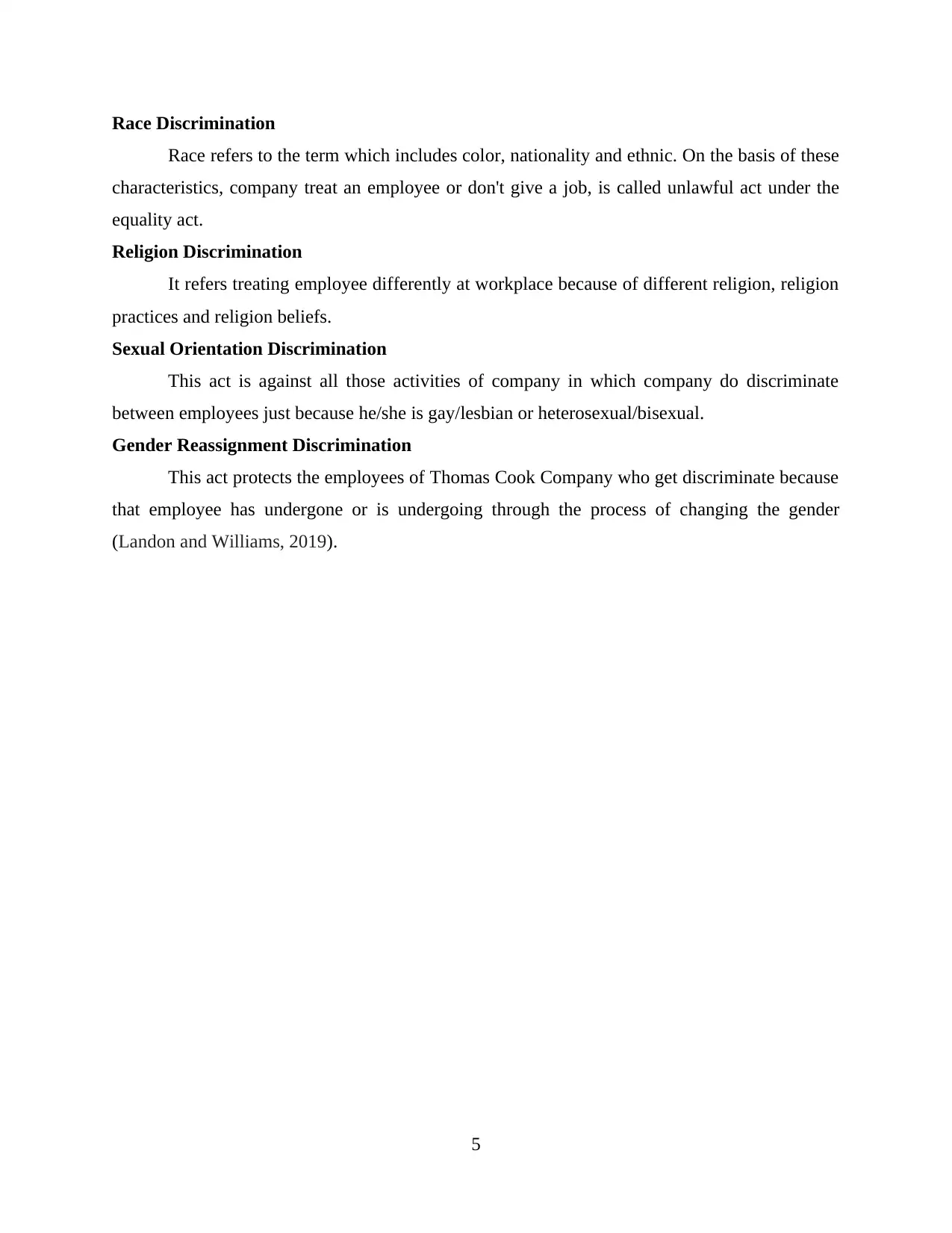
Race Discrimination
Race refers to the term which includes color, nationality and ethnic. On the basis of these
characteristics, company treat an employee or don't give a job, is called unlawful act under the
equality act.
Religion Discrimination
It refers treating employee differently at workplace because of different religion, religion
practices and religion beliefs.
Sexual Orientation Discrimination
This act is against all those activities of company in which company do discriminate
between employees just because he/she is gay/lesbian or heterosexual/bisexual.
Gender Reassignment Discrimination
This act protects the employees of Thomas Cook Company who get discriminate because
that employee has undergone or is undergoing through the process of changing the gender
(Landon and Williams, 2019).
5
Race refers to the term which includes color, nationality and ethnic. On the basis of these
characteristics, company treat an employee or don't give a job, is called unlawful act under the
equality act.
Religion Discrimination
It refers treating employee differently at workplace because of different religion, religion
practices and religion beliefs.
Sexual Orientation Discrimination
This act is against all those activities of company in which company do discriminate
between employees just because he/she is gay/lesbian or heterosexual/bisexual.
Gender Reassignment Discrimination
This act protects the employees of Thomas Cook Company who get discriminate because
that employee has undergone or is undergoing through the process of changing the gender
(Landon and Williams, 2019).
5
Paraphrase This Document
Need a fresh take? Get an instant paraphrase of this document with our AI Paraphraser
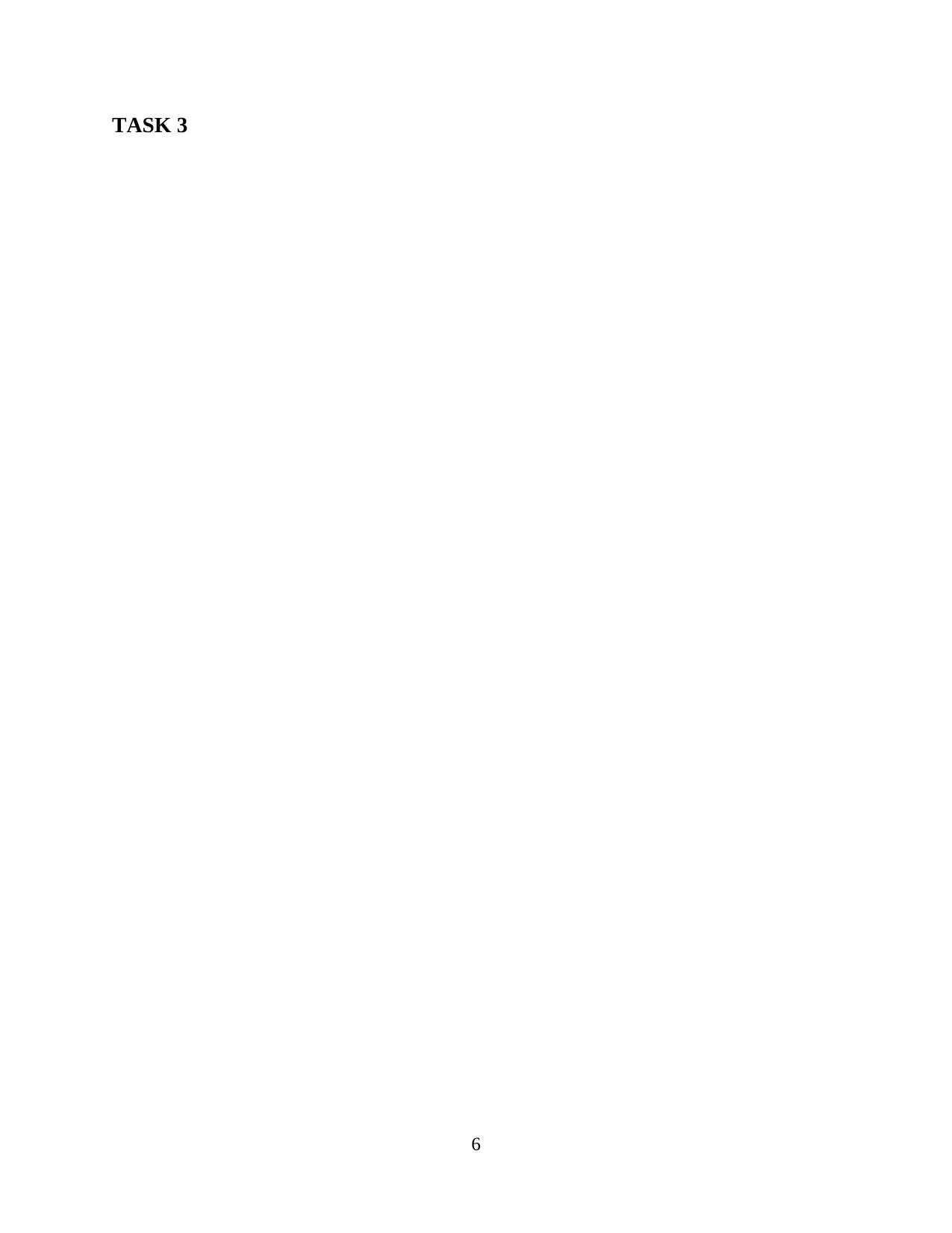
TASK 3
6
6
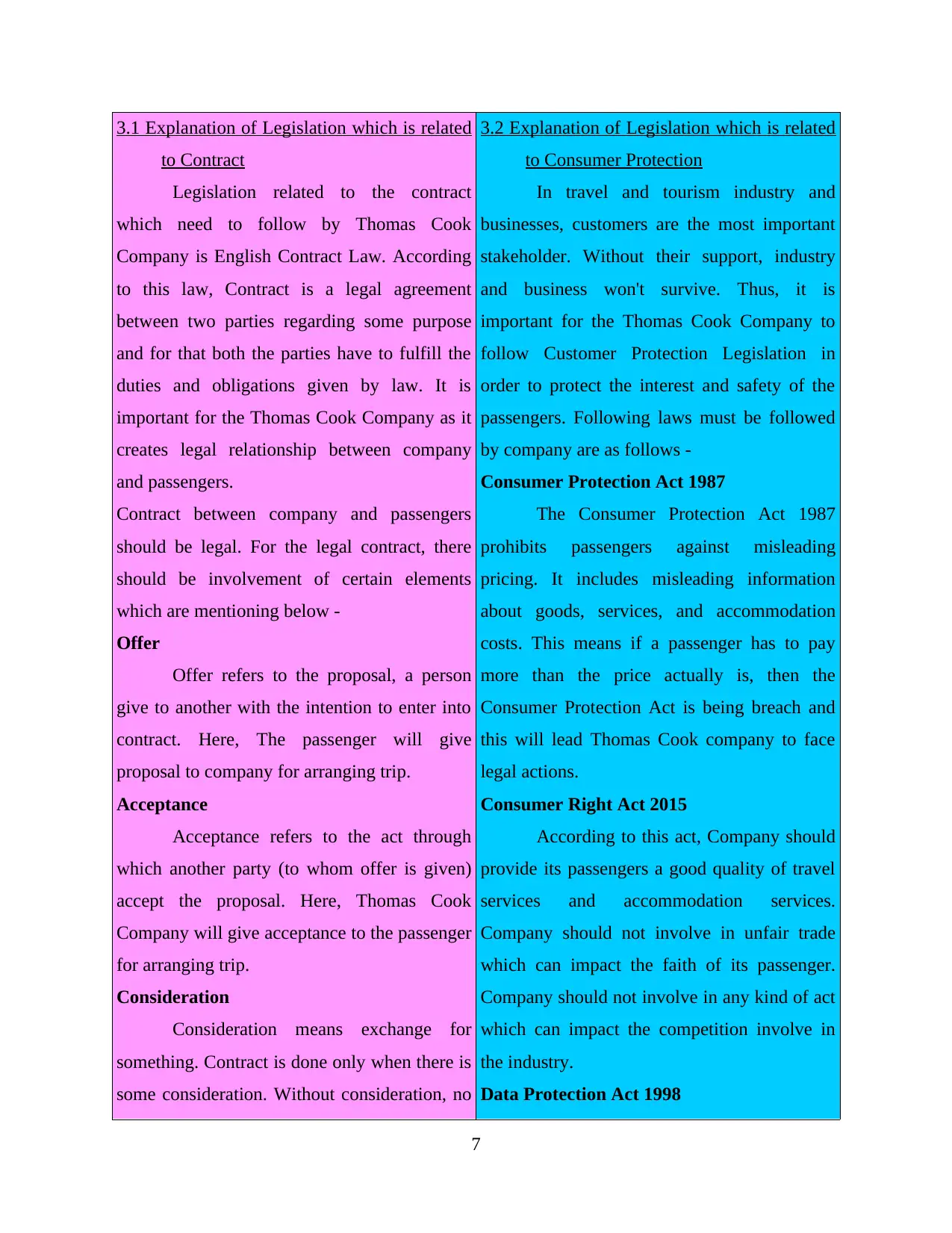
3.1 Explanation of Legislation which is related
to Contract
Legislation related to the contract
which need to follow by Thomas Cook
Company is English Contract Law. According
to this law, Contract is a legal agreement
between two parties regarding some purpose
and for that both the parties have to fulfill the
duties and obligations given by law. It is
important for the Thomas Cook Company as it
creates legal relationship between company
and passengers.
Contract between company and passengers
should be legal. For the legal contract, there
should be involvement of certain elements
which are mentioning below -
Offer
Offer refers to the proposal, a person
give to another with the intention to enter into
contract. Here, The passenger will give
proposal to company for arranging trip.
Acceptance
Acceptance refers to the act through
which another party (to whom offer is given)
accept the proposal. Here, Thomas Cook
Company will give acceptance to the passenger
for arranging trip.
Consideration
Consideration means exchange for
something. Contract is done only when there is
some consideration. Without consideration, no
3.2 Explanation of Legislation which is related
to Consumer Protection
In travel and tourism industry and
businesses, customers are the most important
stakeholder. Without their support, industry
and business won't survive. Thus, it is
important for the Thomas Cook Company to
follow Customer Protection Legislation in
order to protect the interest and safety of the
passengers. Following laws must be followed
by company are as follows -
Consumer Protection Act 1987
The Consumer Protection Act 1987
prohibits passengers against misleading
pricing. It includes misleading information
about goods, services, and accommodation
costs. This means if a passenger has to pay
more than the price actually is, then the
Consumer Protection Act is being breach and
this will lead Thomas Cook company to face
legal actions.
Consumer Right Act 2015
According to this act, Company should
provide its passengers a good quality of travel
services and accommodation services.
Company should not involve in unfair trade
which can impact the faith of its passenger.
Company should not involve in any kind of act
which can impact the competition involve in
the industry.
Data Protection Act 1998
7
to Contract
Legislation related to the contract
which need to follow by Thomas Cook
Company is English Contract Law. According
to this law, Contract is a legal agreement
between two parties regarding some purpose
and for that both the parties have to fulfill the
duties and obligations given by law. It is
important for the Thomas Cook Company as it
creates legal relationship between company
and passengers.
Contract between company and passengers
should be legal. For the legal contract, there
should be involvement of certain elements
which are mentioning below -
Offer
Offer refers to the proposal, a person
give to another with the intention to enter into
contract. Here, The passenger will give
proposal to company for arranging trip.
Acceptance
Acceptance refers to the act through
which another party (to whom offer is given)
accept the proposal. Here, Thomas Cook
Company will give acceptance to the passenger
for arranging trip.
Consideration
Consideration means exchange for
something. Contract is done only when there is
some consideration. Without consideration, no
3.2 Explanation of Legislation which is related
to Consumer Protection
In travel and tourism industry and
businesses, customers are the most important
stakeholder. Without their support, industry
and business won't survive. Thus, it is
important for the Thomas Cook Company to
follow Customer Protection Legislation in
order to protect the interest and safety of the
passengers. Following laws must be followed
by company are as follows -
Consumer Protection Act 1987
The Consumer Protection Act 1987
prohibits passengers against misleading
pricing. It includes misleading information
about goods, services, and accommodation
costs. This means if a passenger has to pay
more than the price actually is, then the
Consumer Protection Act is being breach and
this will lead Thomas Cook company to face
legal actions.
Consumer Right Act 2015
According to this act, Company should
provide its passengers a good quality of travel
services and accommodation services.
Company should not involve in unfair trade
which can impact the faith of its passenger.
Company should not involve in any kind of act
which can impact the competition involve in
the industry.
Data Protection Act 1998
7
⊘ This is a preview!⊘
Do you want full access?
Subscribe today to unlock all pages.

Trusted by 1+ million students worldwide
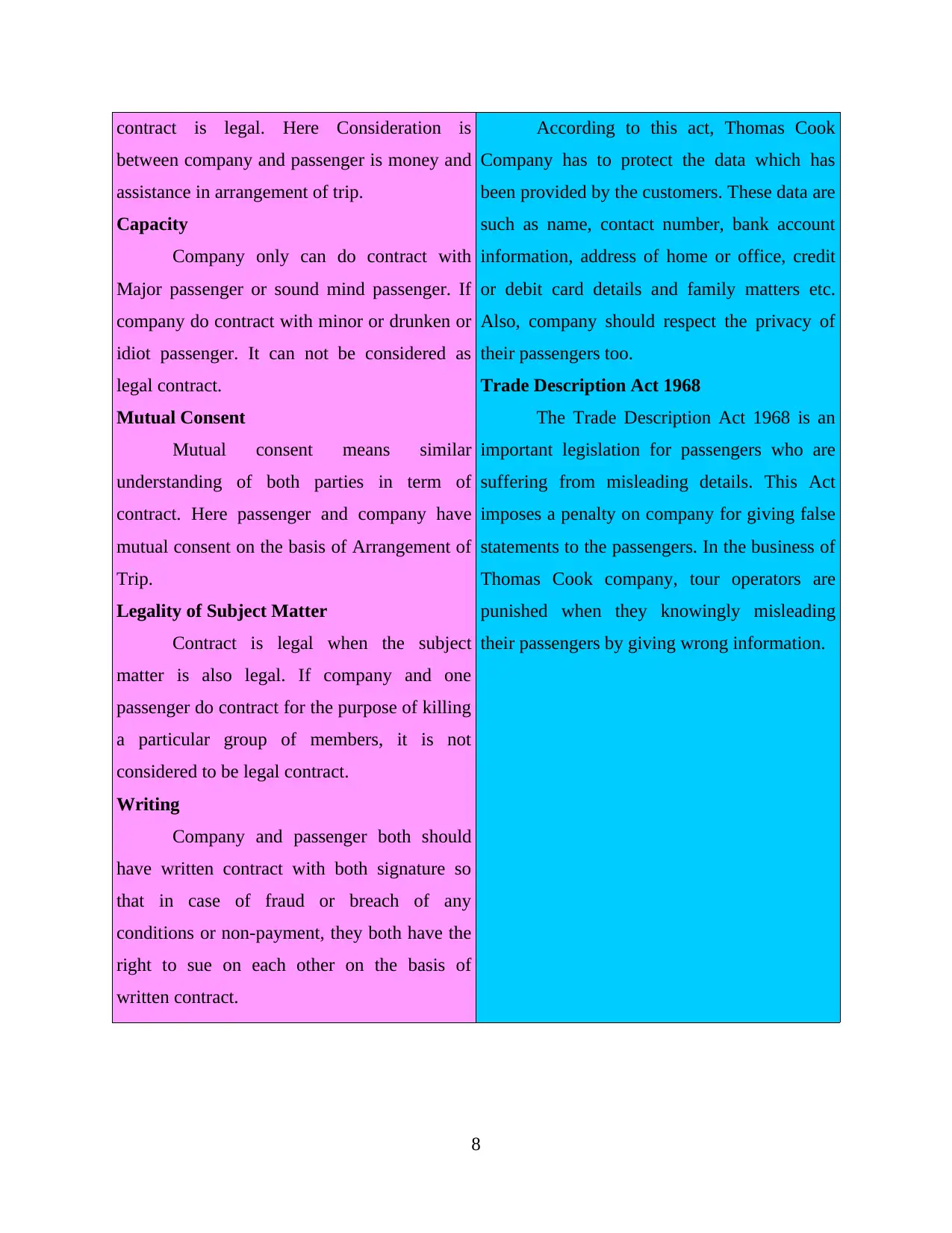
contract is legal. Here Consideration is
between company and passenger is money and
assistance in arrangement of trip.
Capacity
Company only can do contract with
Major passenger or sound mind passenger. If
company do contract with minor or drunken or
idiot passenger. It can not be considered as
legal contract.
Mutual Consent
Mutual consent means similar
understanding of both parties in term of
contract. Here passenger and company have
mutual consent on the basis of Arrangement of
Trip.
Legality of Subject Matter
Contract is legal when the subject
matter is also legal. If company and one
passenger do contract for the purpose of killing
a particular group of members, it is not
considered to be legal contract.
Writing
Company and passenger both should
have written contract with both signature so
that in case of fraud or breach of any
conditions or non-payment, they both have the
right to sue on each other on the basis of
written contract.
According to this act, Thomas Cook
Company has to protect the data which has
been provided by the customers. These data are
such as name, contact number, bank account
information, address of home or office, credit
or debit card details and family matters etc.
Also, company should respect the privacy of
their passengers too.
Trade Description Act 1968
The Trade Description Act 1968 is an
important legislation for passengers who are
suffering from misleading details. This Act
imposes a penalty on company for giving false
statements to the passengers. In the business of
Thomas Cook company, tour operators are
punished when they knowingly misleading
their passengers by giving wrong information.
8
between company and passenger is money and
assistance in arrangement of trip.
Capacity
Company only can do contract with
Major passenger or sound mind passenger. If
company do contract with minor or drunken or
idiot passenger. It can not be considered as
legal contract.
Mutual Consent
Mutual consent means similar
understanding of both parties in term of
contract. Here passenger and company have
mutual consent on the basis of Arrangement of
Trip.
Legality of Subject Matter
Contract is legal when the subject
matter is also legal. If company and one
passenger do contract for the purpose of killing
a particular group of members, it is not
considered to be legal contract.
Writing
Company and passenger both should
have written contract with both signature so
that in case of fraud or breach of any
conditions or non-payment, they both have the
right to sue on each other on the basis of
written contract.
According to this act, Thomas Cook
Company has to protect the data which has
been provided by the customers. These data are
such as name, contact number, bank account
information, address of home or office, credit
or debit card details and family matters etc.
Also, company should respect the privacy of
their passengers too.
Trade Description Act 1968
The Trade Description Act 1968 is an
important legislation for passengers who are
suffering from misleading details. This Act
imposes a penalty on company for giving false
statements to the passengers. In the business of
Thomas Cook company, tour operators are
punished when they knowingly misleading
their passengers by giving wrong information.
8
Paraphrase This Document
Need a fresh take? Get an instant paraphrase of this document with our AI Paraphraser
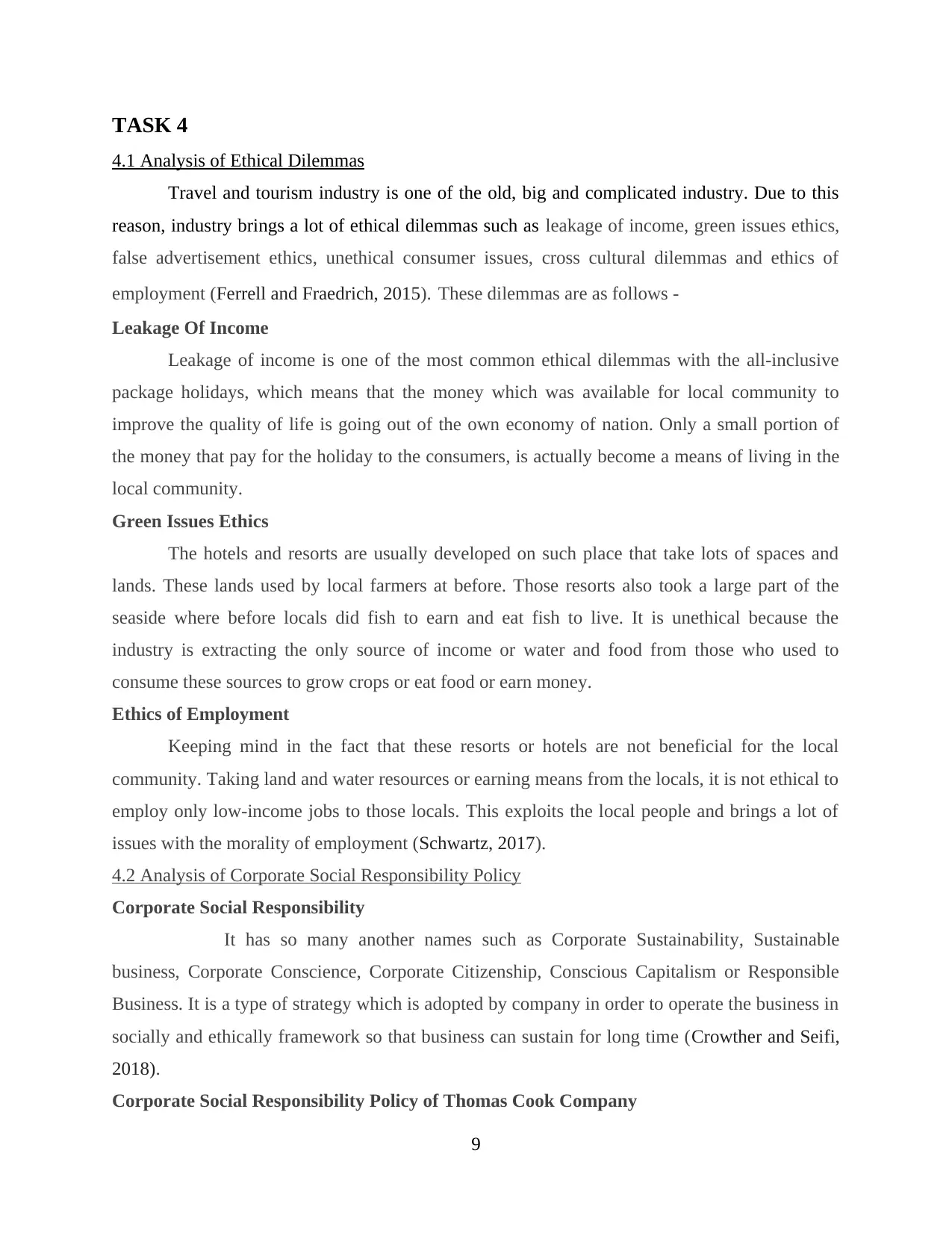
TASK 4
4.1 Analysis of Ethical Dilemmas
Travel and tourism industry is one of the old, big and complicated industry. Due to this
reason, industry brings a lot of ethical dilemmas such as leakage of income, green issues ethics,
false advertisement ethics, unethical consumer issues, cross cultural dilemmas and ethics of
employment (Ferrell and Fraedrich, 2015). These dilemmas are as follows -
Leakage Of Income
Leakage of income is one of the most common ethical dilemmas with the all-inclusive
package holidays, which means that the money which was available for local community to
improve the quality of life is going out of the own economy of nation. Only a small portion of
the money that pay for the holiday to the consumers, is actually become a means of living in the
local community.
Green Issues Ethics
The hotels and resorts are usually developed on such place that take lots of spaces and
lands. These lands used by local farmers at before. Those resorts also took a large part of the
seaside where before locals did fish to earn and eat fish to live. It is unethical because the
industry is extracting the only source of income or water and food from those who used to
consume these sources to grow crops or eat food or earn money.
Ethics of Employment
Keeping mind in the fact that these resorts or hotels are not beneficial for the local
community. Taking land and water resources or earning means from the locals, it is not ethical to
employ only low-income jobs to those locals. This exploits the local people and brings a lot of
issues with the morality of employment (Schwartz, 2017).
4.2 Analysis of Corporate Social Responsibility Policy
Corporate Social Responsibility
It has so many another names such as Corporate Sustainability, Sustainable
business, Corporate Conscience, Corporate Citizenship, Conscious Capitalism or Responsible
Business. It is a type of strategy which is adopted by company in order to operate the business in
socially and ethically framework so that business can sustain for long time (Crowther and Seifi,
2018).
Corporate Social Responsibility Policy of Thomas Cook Company
9
4.1 Analysis of Ethical Dilemmas
Travel and tourism industry is one of the old, big and complicated industry. Due to this
reason, industry brings a lot of ethical dilemmas such as leakage of income, green issues ethics,
false advertisement ethics, unethical consumer issues, cross cultural dilemmas and ethics of
employment (Ferrell and Fraedrich, 2015). These dilemmas are as follows -
Leakage Of Income
Leakage of income is one of the most common ethical dilemmas with the all-inclusive
package holidays, which means that the money which was available for local community to
improve the quality of life is going out of the own economy of nation. Only a small portion of
the money that pay for the holiday to the consumers, is actually become a means of living in the
local community.
Green Issues Ethics
The hotels and resorts are usually developed on such place that take lots of spaces and
lands. These lands used by local farmers at before. Those resorts also took a large part of the
seaside where before locals did fish to earn and eat fish to live. It is unethical because the
industry is extracting the only source of income or water and food from those who used to
consume these sources to grow crops or eat food or earn money.
Ethics of Employment
Keeping mind in the fact that these resorts or hotels are not beneficial for the local
community. Taking land and water resources or earning means from the locals, it is not ethical to
employ only low-income jobs to those locals. This exploits the local people and brings a lot of
issues with the morality of employment (Schwartz, 2017).
4.2 Analysis of Corporate Social Responsibility Policy
Corporate Social Responsibility
It has so many another names such as Corporate Sustainability, Sustainable
business, Corporate Conscience, Corporate Citizenship, Conscious Capitalism or Responsible
Business. It is a type of strategy which is adopted by company in order to operate the business in
socially and ethically framework so that business can sustain for long time (Crowther and Seifi,
2018).
Corporate Social Responsibility Policy of Thomas Cook Company
9
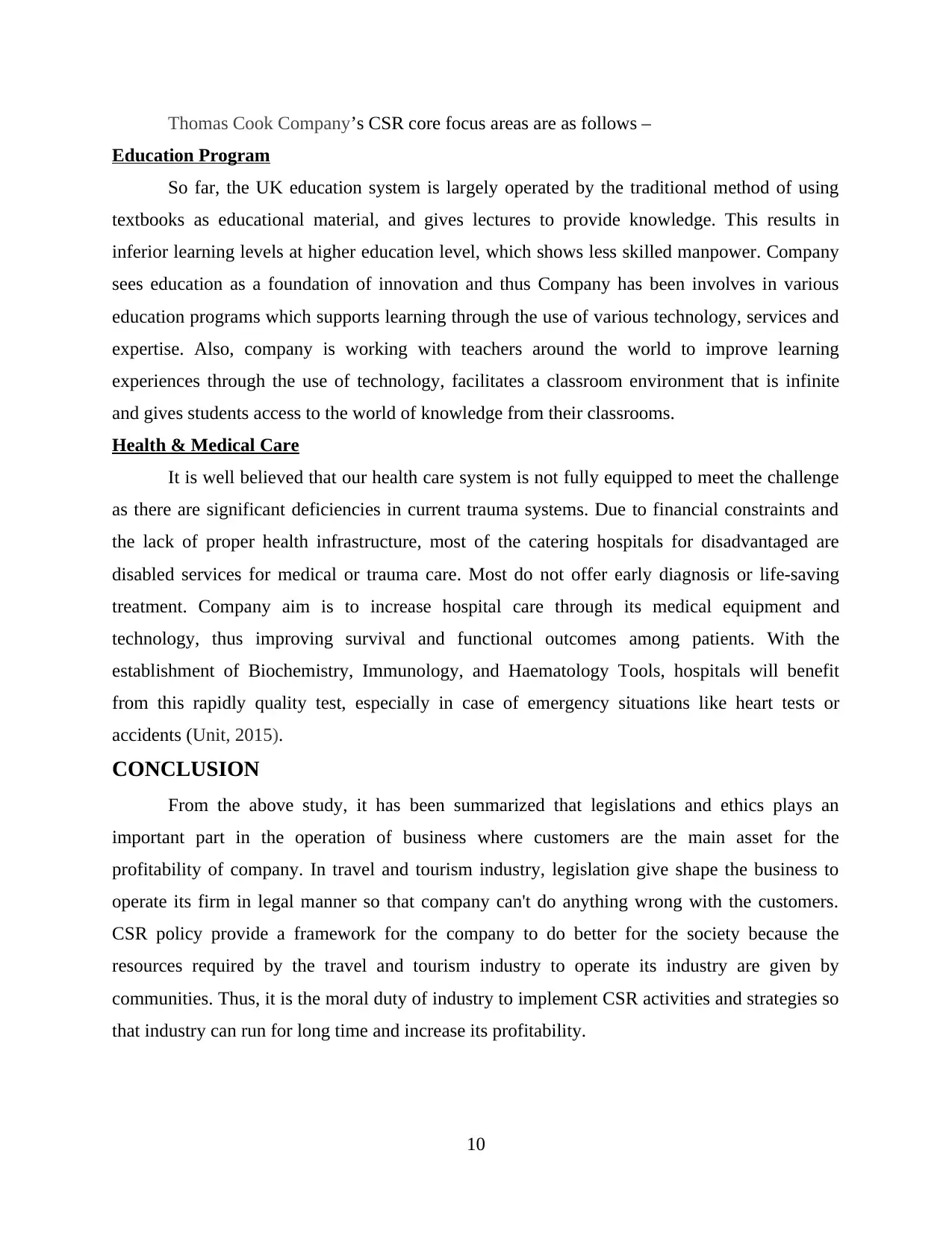
Thomas Cook Company’s CSR core focus areas are as follows –
Education Program
So far, the UK education system is largely operated by the traditional method of using
textbooks as educational material, and gives lectures to provide knowledge. This results in
inferior learning levels at higher education level, which shows less skilled manpower. Company
sees education as a foundation of innovation and thus Company has been involves in various
education programs which supports learning through the use of various technology, services and
expertise. Also, company is working with teachers around the world to improve learning
experiences through the use of technology, facilitates a classroom environment that is infinite
and gives students access to the world of knowledge from their classrooms.
Health & Medical Care
It is well believed that our health care system is not fully equipped to meet the challenge
as there are significant deficiencies in current trauma systems. Due to financial constraints and
the lack of proper health infrastructure, most of the catering hospitals for disadvantaged are
disabled services for medical or trauma care. Most do not offer early diagnosis or life-saving
treatment. Company aim is to increase hospital care through its medical equipment and
technology, thus improving survival and functional outcomes among patients. With the
establishment of Biochemistry, Immunology, and Haematology Tools, hospitals will benefit
from this rapidly quality test, especially in case of emergency situations like heart tests or
accidents (Unit, 2015).
CONCLUSION
From the above study, it has been summarized that legislations and ethics plays an
important part in the operation of business where customers are the main asset for the
profitability of company. In travel and tourism industry, legislation give shape the business to
operate its firm in legal manner so that company can't do anything wrong with the customers.
CSR policy provide a framework for the company to do better for the society because the
resources required by the travel and tourism industry to operate its industry are given by
communities. Thus, it is the moral duty of industry to implement CSR activities and strategies so
that industry can run for long time and increase its profitability.
10
Education Program
So far, the UK education system is largely operated by the traditional method of using
textbooks as educational material, and gives lectures to provide knowledge. This results in
inferior learning levels at higher education level, which shows less skilled manpower. Company
sees education as a foundation of innovation and thus Company has been involves in various
education programs which supports learning through the use of various technology, services and
expertise. Also, company is working with teachers around the world to improve learning
experiences through the use of technology, facilitates a classroom environment that is infinite
and gives students access to the world of knowledge from their classrooms.
Health & Medical Care
It is well believed that our health care system is not fully equipped to meet the challenge
as there are significant deficiencies in current trauma systems. Due to financial constraints and
the lack of proper health infrastructure, most of the catering hospitals for disadvantaged are
disabled services for medical or trauma care. Most do not offer early diagnosis or life-saving
treatment. Company aim is to increase hospital care through its medical equipment and
technology, thus improving survival and functional outcomes among patients. With the
establishment of Biochemistry, Immunology, and Haematology Tools, hospitals will benefit
from this rapidly quality test, especially in case of emergency situations like heart tests or
accidents (Unit, 2015).
CONCLUSION
From the above study, it has been summarized that legislations and ethics plays an
important part in the operation of business where customers are the main asset for the
profitability of company. In travel and tourism industry, legislation give shape the business to
operate its firm in legal manner so that company can't do anything wrong with the customers.
CSR policy provide a framework for the company to do better for the society because the
resources required by the travel and tourism industry to operate its industry are given by
communities. Thus, it is the moral duty of industry to implement CSR activities and strategies so
that industry can run for long time and increase its profitability.
10
⊘ This is a preview!⊘
Do you want full access?
Subscribe today to unlock all pages.

Trusted by 1+ million students worldwide
1 out of 13
Related Documents
Your All-in-One AI-Powered Toolkit for Academic Success.
+13062052269
info@desklib.com
Available 24*7 on WhatsApp / Email
![[object Object]](/_next/static/media/star-bottom.7253800d.svg)
Unlock your academic potential
Copyright © 2020–2026 A2Z Services. All Rights Reserved. Developed and managed by ZUCOL.



